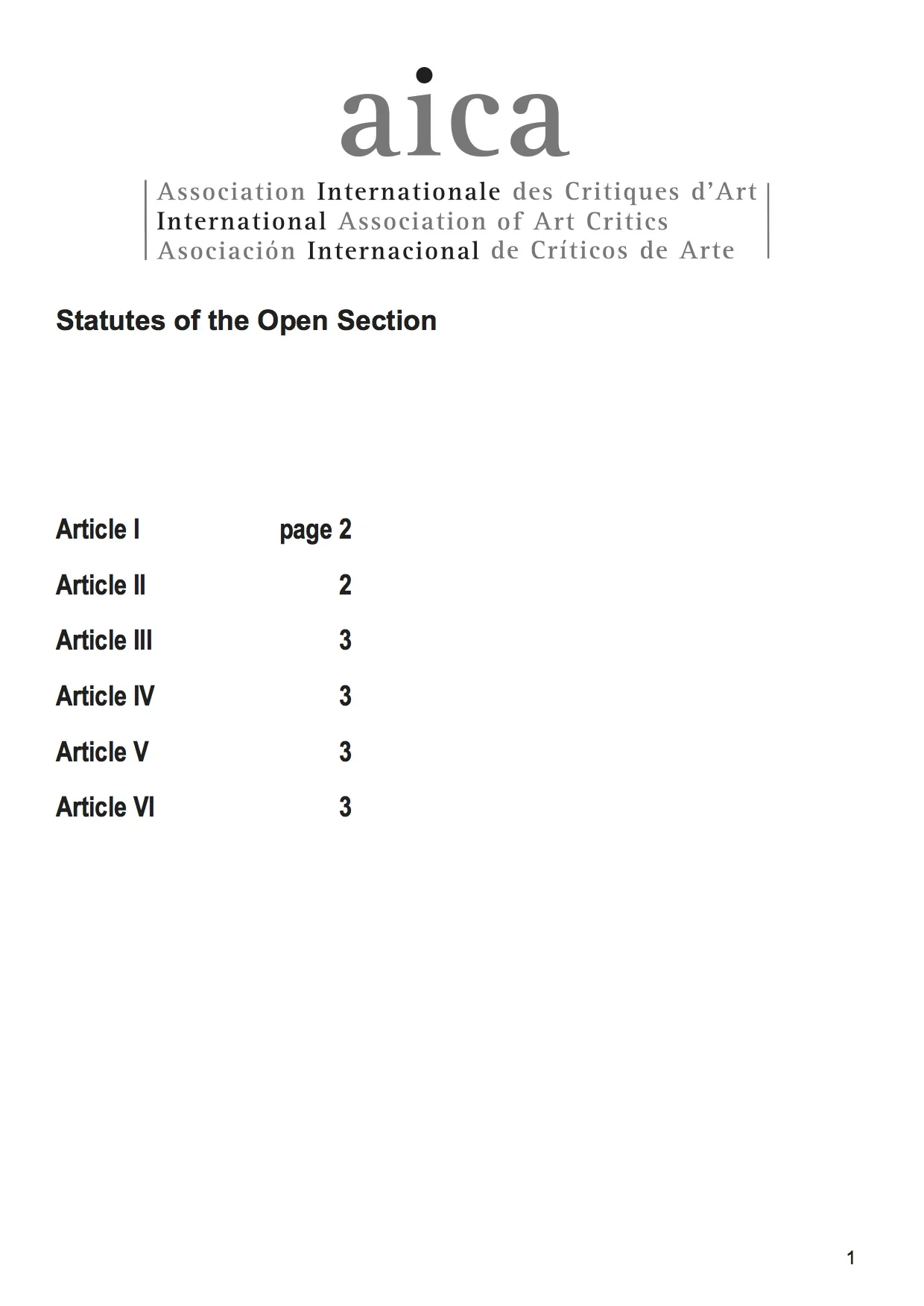Statutes of the Open Section
Article I
1. The Open Section of the International Association of Art Critics (AICA) is established under the terms of the International Statutes of the Association, approved by the General Assembly at its meeting in Martinique on 16 November 2003. It is a constituent part of its parent body, an international, non-governmental Association, with its headquarters in Paris.
2. As a Section of the International Association, the Open Section has Statutes, which closely reflect those of the parent organisation. These must be kept up-to-date with those of International AICA and formally approved by AICA’s Administrative Council and General Assembly.
3. The Open Section brings together art critics, whose professional activity is criticism in all media, teaching, or curating exhibitions. The Members of the Section may reside anywhere in the world, but usually come from countries which have not a National Section of their own. Alternatively, they may come from countries with National Sections which, for valid reasons acceptable to the Administrative Council, they not wish, or are unable, to join (see the International Statutes Article V Section 3).
4. The aims of the Open Section of AICA are:
to promote art criticism as a discipline and contribute to its methodology
to promote the ethical and professional interests of its Members and defend their rights
to maintain an active national and international network for its Members, with the aid of the available systems of communication, and encouragement of face-to-face encounters
to contribute to mutual understanding of visual arts and aesthetics in all cultures
to stimulate professional relationships across political, geographical, ethnic, economic and religious boundaries
impartially to defend freedom of expression and thought, and oppose arbitrary censorship
5. The location of the Association’s registered office is that of the Executive Bureau of AICA, namely: 32 rue Yves Toudic, 75010 Paris, France.
6. The Statutes and Regulations of the Open Section are subject to the same conditions and constraints as those of the International AICA (see the International Statutes Article V Section 3).
7. The duration of the Section is unlimited.
Article II
1. The Section is made up of Individual Members, Benefactor Members and Honorary Members. The number of Members is not limited.
2. Applicants for membership must be submitted to the Secretary-General of the Association, in the first instance. Applicants must be able to provide evidence of sustained activity over the previous three years, in one or more of the following areas:
daily/periodical press, or broadcasting on radio, TV or video, or in the electronic media
publication of works of art history, aesthetics or criticism
teaching of art criticism, art history, aesthetics, curating, or art, at higher or tertiary level
curatorial work and analysis for educational or scholarly ends, including the production of scholarly or critical texts for museums or galleries, whose principal aim is not essentially commercial
3. Candidates are elected by unanimous agreement of the Bureau, comprising, ex officio, the International President, Secretary-General and Treasurer of the Association, as noted above and must be endorsed by the General Assembly of AICA, acting on the advice of the Association’s Electoral and Membership Commission and Administrative Council.
4. Membership is forfeited
by resignation
by non-payment of the membership fee for two years
by expulsion at a General Assembly of AICA, if so recommended by the Administrative Council, on grounds of serious misconduct.
Article III
1. The Open Section is headed by a Board, made up of the International President of the Association, the Secretary-General and the Treasurer, all of whom act ex officio for the duration of their terms as office-holders with the parent organisation.
2. The Treasurer of the Board collects members’ dues and is responsible for remittances to the Association’s Headquarters.
3. The Secretary-General or his/her Assistant is in charge of the administration.
4. There is no provision for the members of the Open Section to meet or vote on issues, other than in their capacity as individual members of the Association at the General Assembly.
5. All individual members of the Open Section must contribute the standard rate of 30 €.
Article IV
1. The resources of the Section are made up of:
the Membership dues,
all legally authorised resources
all subsidies which the Section is entitled to receive.
2. All Members, except Honorary Members, pay fixed annual dues, which are set at the time of the General Assembly. The Board of the Open Section may, at its discretion, waive a part or the whole of their Honorary Members’ annual dues, but it must still pass on the appropriate annual dues for these Honorary Members to the Association’s Headquarters. Benefactor Members will be expected to contribute annually to the Section’s finances, at a level in excess of that set for ordinary Members.
Article V
1. The Board may propose modifications to the Statutes of the Open Section. All such proposals must be forwarded, in writing, to all members of the Administrative Council of AICA at least one month prior to the General Assembly at which they are to be discussed and voted upon. All modifications to the Statutes proposed in this way must be approved by a two thirds majority of those attending the meeting of the Administrative Council, who are eligible to vote.
2. The Membership of the Section may itself initiate proposals to modify the Statutes. In order to succeed, any such proposal must receive the support of two thirds of the Members who are present and eligible to vote, on two successive occasions.
Article VI
1. The Section may be dissolved, following a motion presented by Officials or Members at a meeting of the Administrative Council of AICA and a vote in favour of this by at least three quarters of the Members present at that meeting.
2. In case of dissolution, the assets of the Section will be taken over in their entirely by the parent organisation.

